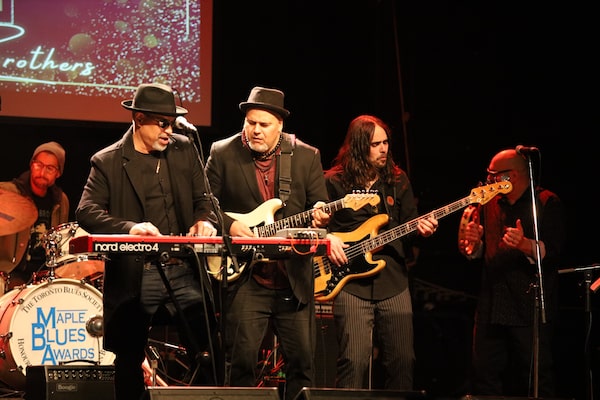
The Blackburn Brothers were up for nine Maple Blues Awards this year.Greg King/Handout
At last month’s annual Canadian blues music gala held in Toronto, the Blackburn Brothers were up for a whopping nine Maple Blues Awards and were one of the night’s headlining performers. The Toronto family band composed of Black musicians left the ceremony empty-handed, though, failing to cash in on a single nomination.
The shut-out triggered a quick backlash on social media against the Toronto Blues Society (TBS), the organization which manages the awards. The low number of Black award recipients has been a long simmering issue within the country’s blues community and now it had come to a head.
According to TBS president Derek Andrews, the 39-person Maple Blues nominating panel is made up of white radio programmers and blues festivals organizers. “They play Black artists on their radio shows and they program Black artists in their festivals,” Andrews said. “But the fanbase tends to be dominantly white.”
Over the past four years, Black artists have received 64 nominations, according to figures provided by TBS, resulting in just six wins. At this year’s awards, all 22 Black nominees came away empty-handed.
Most of the awards are chosen by public vote. “The nominating committee put Black artists on the ballot, but the public didn’t reward them this year,” Andrews said. “The popularity contest makes the process vulnerable, and it is a concern.”
In his role as president, he had counted the votes in advance of the awards gala, and was not surprised with the upset reaction.
“When I looked at the winners, I thought, ‘Oh my god, this is just like when Drake was shut out at the Junos,’ “ Andrews said. “We were very disappointed with how the votes came through.”
Frustrated by his lack of Juno success over the years, Drake, indisputably an international superstar, has boycotted the Junos since 2017.
Similarly, some Black Canadian musicians have moved on from Maple Blues. Hamilton’s Harrison Kennedy, a veteran star of the genre, said he wasn’t even aware of this year’s awards ceremony. He declined to comment further for this article.
Kennedy has been nominated dozens of times, but has only won once – last year, for lifetime achievement. The Juno recipient is signed to the Electro-Fi blues label run by Andrew Galloway.
“This lack of love and respect at home for artists of colour has become ridiculous,” Galloway said in an e-mail. “The Maple Blues Awards under the Toronto Blues Society have consistently slighted and ignored the very artists they should have celebrated.”
Prominent Black singer Shakura S’Aida declined to comment when contacted by The Globe. Through a family representative, the Blackburn Brothers also turned down an interview request. The band did release an online statement, however, saying their award shut-out is “the stuff that keeps us going, keeps us motivated, and makes us dig even deeper to deliver and share with you everything we’ve got ...”
Artists and bands who tour regularly tend to do better in the voting, which is cross-country – the industrious New Brunswick singer-songwriter/guitarist Matt Andersen claimed four awards last month, including entertainer of the year.
In response to the criticism over the voting process following this year’s awards, TBS posted a statement on social media saying the society would be consulting with various stakeholders to “reassess and reconsider” the voting procedures, in order to “make them more transparent” to the membership and general public.
The TBS regularly features Black and Indigenous musicians in its monthly Maple Blues Newsletter – since 2020, 29 of 51 newsletters have featured a racialized artist on the cover.
“It would be unfair to say that the Toronto Blues Society has not made any effort in terms of inclusivity,” said actor/musician Raoul Bhaneja. “But what happened at Maple Blues is emblematic of where things are still at, and that’s the sad part.”
The society was criticized when it failed to immediately support Black Lives Matter after the murder of George Floyd by policemen in Minneapolis, Minn., on May 25, 2020. Twelve days later, the TBS addressed the issue with a statement that included this apology: “Regrettably we didn’t make a statement of support of the tidal wave of awakening taking place around the world addressing systemic racism and the need for change.”
In 2022, at the TBS-sponsored biannual Blues Summit conference of musicians and key industry players, singer Diana Braithwaite delivered a keynote speech calling for more representation of Black and Indigenous musicians in the country’s blues infrastructure. She was the first racialized person to make a keynote address in the more than 20 years of summits.
Braithwaite’s watershed speech triggered conversations, awareness and TBS townhalls. “What I heard from the Black music community is that they felt excluded or passed over,” said TBS member Bhaneja, whose 2014 play Life, Death and the Blues addressed cultural appropriation in music. “We’re clearly not doing a good job.”
Speaking with The Globe and Mail after this year’s Maple Blues, Braithwaite addressed the lack of Black people in audiences and on stages at blues festivals and concerts in Canada. “We have to go back to the roots of the blues and realize that the Black community has a connection to the blues that is important to its survival today.”
Although Braithwaite acknowledged the Maple Blues voting rules needed to be changed, she cautioned against tokenism. “The last thing we want is to win an award just because we are Black. That doesn’t work either. In fact, that will bring more resentment and tension to the discussion.”
Part of the discussion relates to the lack of diversity among positions of leadership in the blues industry – not just racially, but age wise. “We need younger people to be involved in this,” said Bhaneja.
The 73-year-old Andrews, volunteer president of TBS since its inception in 1985 and the director of the Soul ‘n’ Blues Festival at Harbourfront Centre from 1986 to 2003, says he has sought a replacement for years. “We are finalizing a strategic plan that involves succession steps and younger TBS executives stepping into leadership roles,” he said.
Braithwaite, a veteran artist and former TBS board member, agrees new blood is needed. “At this point, there are a few holdouts to change – blues industry older stalwarts that are blocking the real progress that could change the whole game.”
 Brad Wheeler
Brad Wheeler